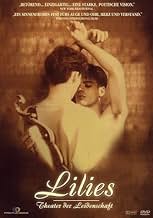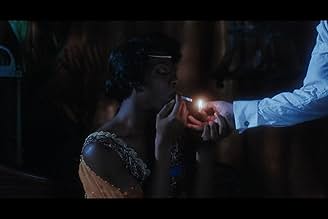Ajouter une intrigue dans votre langueWhen a bishop comes to a prison to hear the confession of an old friend he is forced to watch a play, performed by the inmates, about their youth together, love and betrayal.When a bishop comes to a prison to hear the confession of an old friend he is forced to watch a play, performed by the inmates, about their youth together, love and betrayal.When a bishop comes to a prison to hear the confession of an old friend he is forced to watch a play, performed by the inmates, about their youth together, love and betrayal.
- Prix
- 8 victoires et 14 nominations au total
Benoît Lagrandeur
- Prison Ensemble
- (as Benoit Lagrandeur)
Pierre Leblanc
- Prison Ensemble
- (as Pierre LeBlanc)
Jean Lévesque
- Prison Ensemble
- (as Jean Levesque)
Avis en vedette
10bob-504
Luscious cinematography, soulful musical score, terrific casting, and limited use of revelatory flashbacks to dramatize the theme of societally-defined mores and criminal behavior. Artistic and judicious use of nudity and sexuality to illustrate the dilemmas of public versus private morality.
This film stands out in my collection as the most beautiful gay love story on film so far. It's lyrical story-telling is accented by it's Romeo & Juliet-inspired forbidden love theme, while avoiding any political message that plagues today's current stream of gay love stories. With it's gorgeous location, haunting sound-track and surreal moments of simple tenderness, Lilies succeeds at simply being a beautiful film.
"Lilies" is an achingly beautiful work. The acting, cinematography, music and sets are stunning. The use of only male actors, including for female characters, seems right here. And in the final analysis, the best and worst of human emotion (especially concealed jealously) becomes so vividly portrayed that one is not sure whether to laugh, cry, or yell out with anger at the characters' actions. Anyone who considers themselves a "cinema buff" should put this one one their "must see" list. So, when does the DVD come out???
After a spate of disappointing gay films in the mid 90's, Lilies appeared from Canada as a fresh bouquet presenting a refreshing change of pace. Improving upon the play its based on, Lilies uses various cinematic conventions to its advantage, with cuts between prison re-enactments and the actual events given seamlessly and often artisticly breathtaking. The use of cross gender casting (this is an all male film) is humorous to a degree, but never in a mocking drag queen tone. We come to believe these men are really women. And the coming of age love story at the center of the plot, done to death by so many other films, is achingly tender.
It was once said that gay work has to have someone die in it and this film is no exception. But the deaths portrayed here and the long hidden betrayal finally revealed are handled quite effectively. The artifice involved only adds an extra layer of beauty upon the story. A remarkable acheivement.
It was once said that gay work has to have someone die in it and this film is no exception. But the deaths portrayed here and the long hidden betrayal finally revealed are handled quite effectively. The artifice involved only adds an extra layer of beauty upon the story. A remarkable acheivement.
LILIES, based on a Canadian play 'Les feluettes' by Michel Marc Bouchard, has been adapted to the screen by Bouchard and placed in the sensitive hands of director John Greyson, an artist who is able to indulge in surrealism with reality and make it work well. This very beautiful film is cast entirely with men despite the fact that there are women roles in the story. How does he make that work successfully without pandering to artiness? View this little film and make the discovery for your self.
Set in Quebec in a prison, Bishop Bilodeau (Marcel Sabourin) has been summoned form the outside to hear the confession of 'a very sick man' who has been imprisoned for 40 years for a murder. Upon the Bishop's arrival the audience knows something is amiss: despite the atmosphere of the prison as a stage accompanied by choral singing of plainsong (The Hilliard Ensemble) there are props and images that seem out of place in a grim prison. The Bishop is ushered into the confessional booth and when he opens the window to hear confession, the person in the seat is Simon (Aubert Pallascio) the 'very sick' man who has planned for the bishop to watch a play depicting the 40 year old crime - a reverse on the confessional stance.Through a small aperture in the bishop's now locked confessional, the Bishop is forced to watch a reenactment of the incident 40 years ago when two young boys, Simon (Jason Cadieux) and Vallier (Danny Gilmore) were in love and the young future Bishop (Matthew Ferguson) was jealous of Vallier's attention from Simon and played a key role in 'murder' of Vallier that resulted in Simon's being accused and imprisoned. The atmosphere leading up to this act includes the reaction from the small town's homophobia and to Simon's sexual ambiguity that involves a strange lady Lydie-Anne (Alexander Chapman) who arrives form Paris via an air balloon. It is the interaction of the boys with the townsfolk, the new lady arrival who desires Simon's affections, and Vallier's understanding and self-sacrificing mother Countess De Tilly (Brent Carver) that leads to the fateful death of Simon. How the story ends in the confessional booth reversal is the beauty of the film that must be left unsaid for the drama to affect potential audiences of this movie.
The cast is all male because the whole story is a mise-en-scene, a play within a play, where all parts are acted by the prisoners for the sake of displaying truth to the Bishop. There is no pretense at making the men look like women except for the costumes and this enhances the message of the story. The actors are excellent and the impact of the story is powerful. Yes, this is a highly honored gay-themed film, but it is really more about the power of love both in youths and in thwarted adults that makes it a film for all audiences. Highly Recommended. Grady Harp
Set in Quebec in a prison, Bishop Bilodeau (Marcel Sabourin) has been summoned form the outside to hear the confession of 'a very sick man' who has been imprisoned for 40 years for a murder. Upon the Bishop's arrival the audience knows something is amiss: despite the atmosphere of the prison as a stage accompanied by choral singing of plainsong (The Hilliard Ensemble) there are props and images that seem out of place in a grim prison. The Bishop is ushered into the confessional booth and when he opens the window to hear confession, the person in the seat is Simon (Aubert Pallascio) the 'very sick' man who has planned for the bishop to watch a play depicting the 40 year old crime - a reverse on the confessional stance.Through a small aperture in the bishop's now locked confessional, the Bishop is forced to watch a reenactment of the incident 40 years ago when two young boys, Simon (Jason Cadieux) and Vallier (Danny Gilmore) were in love and the young future Bishop (Matthew Ferguson) was jealous of Vallier's attention from Simon and played a key role in 'murder' of Vallier that resulted in Simon's being accused and imprisoned. The atmosphere leading up to this act includes the reaction from the small town's homophobia and to Simon's sexual ambiguity that involves a strange lady Lydie-Anne (Alexander Chapman) who arrives form Paris via an air balloon. It is the interaction of the boys with the townsfolk, the new lady arrival who desires Simon's affections, and Vallier's understanding and self-sacrificing mother Countess De Tilly (Brent Carver) that leads to the fateful death of Simon. How the story ends in the confessional booth reversal is the beauty of the film that must be left unsaid for the drama to affect potential audiences of this movie.
The cast is all male because the whole story is a mise-en-scene, a play within a play, where all parts are acted by the prisoners for the sake of displaying truth to the Bishop. There is no pretense at making the men look like women except for the costumes and this enhances the message of the story. The actors are excellent and the impact of the story is powerful. Yes, this is a highly honored gay-themed film, but it is really more about the power of love both in youths and in thwarted adults that makes it a film for all audiences. Highly Recommended. Grady Harp
Le saviez-vous
- Citations
Young Simon: [to Vallier] I shall be reborn. My breath in the heavens, bear witness. We shall be free. We'll we be loved. If you do truly love me, let your love be known unto me.
Meilleurs choix
Connectez-vous pour évaluer et surveiller les recommandations personnalisées
- How long is Lilies?Propulsé par Alexa
Détails
Box-office
- Budget
- 2 200 000 $ (estimation)
- Brut – États-Unis et Canada
- 301 548 $ US
- Fin de semaine d'ouverture – États-Unis et Canada
- 28 781 $ US
- 12 oct. 1997
- Brut – à l'échelle mondiale
- 301 548 $ US
Contribuer à cette page
Suggérer une modification ou ajouter du contenu manquant

Lacune principale
By what name was Lilies - Les feluettes (1996) officially released in India in English?
Répondre































